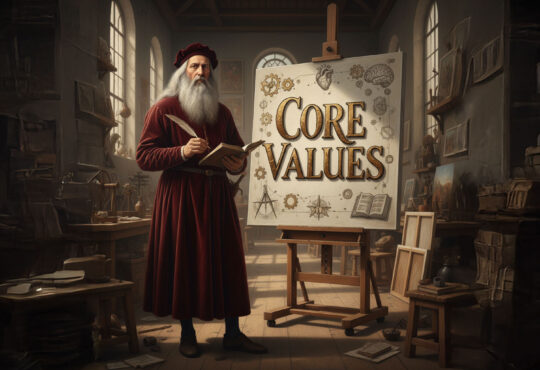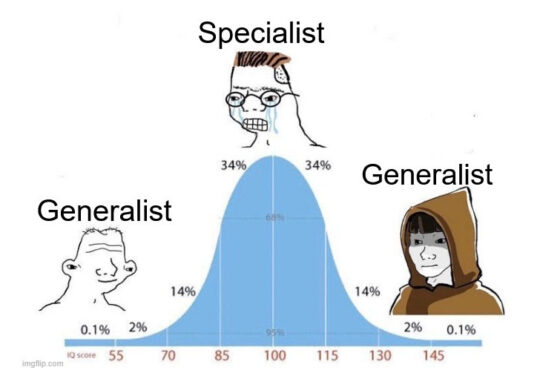
Why Invention, Business, and Relationships All Obey the Same Laws
Life Doesn’t Come With a Manual. And That’s the Problem.
A few months ago, I sat at my desk staring at three browser tabs:
- A YouTube video on how the light bulb was invented.
- A business podcast dissecting Airbnb’s meteoric rise.
- A self-help article about how to make friends as an adult.
And it hit me.
These three topics, which seem to live in completely different universes, are actually playing out the same game.
They’re governed by the same principles.
So I’m starting to build a framework – a kind of mental model for everything.
I stumbled across a single question that rewired my thinking:
What if business, invention, and relationships all succeed (or fail) for the same reasons – just under different names?
And what if those reasons were universal?
The Trap of Treating Life Like Separate Silos
You know the story: You try to fix one area of your life, let’s say, your health. You buy supplements. Start lifting. Watch Huberman videos. Then… stress at work explodes. Your sleep tanks. You quit the gym. Two weeks later you’re back where you started.
Or you try to start a side business. You make a few Canva designs, launch an Etsy shop. Then no one buys. You give up. Why? Because your idea didn’t get traction socially. You didn’t understand trust. Or timing. Or energy.
We treat these failures as isolated. As if business failure is different from relationship failure. Or as if inventing a useful tool is some divine genius miracle unrelated to the rest of life.
But I’ve found the opposite to be true.
Whether you’re building a machine, building a business, or building a reputation, you are constrained by the same invisible forces.
I call them The Laws of Practical Success – and they come from physics and economics.
But they show up everywhere.
A Unified Framework of Physics + Economics
⚛️ Physics: The Laws of System Behavior
Applies to everything: machines, ecosystems, organizations, even social groups.
| Physics Principle | In Business | In Social Life |
| Energy Input | Capital, labor, time | Attention, emotional presence |
| Friction | Bureaucracy, miscommunication | Social tension, misunderstanding |
| Leverage | Technology, automation | Charisma, trust, network effects |
| Entropy | Obsolete models, atrophy | Neglected relationships, apathy |
| Equilibrium | Market forces | Reciprocity, balance in dynamics |
💵 Economics: The Laws of Human Trade-Offs
Kicks in when people have to decide:
- What’s worth their time?
- What creates the most value?
- What’s the return on effort or emotion?
- What’s scarce, and what isn’t?
| Economic Principle | In Business | In Social Life |
| Opportunity Cost | Investing in Product A vs. B | Spending time with Person A vs. B |
| Utility | Solving real customer pain | Providing emotional or intellectual value |
| Incentives | Profits, recognition, growth | Belonging, status, meaning |
| Marginal Value | Where to put the next unit of effort | Which relationships need attention today |
| Scarcity | Limited funds, time, or attention | Limited bandwidth for intimacy or influence |
So now we have a powerful mental model:
Physics for how things move.
Economics for why humans care.
Real Examples From My Life (and the Lives of Icons)
The Day I Realized My Relationships Had Friction
Let me tell you a quick story.
Years ago, I noticed that my relationship with my daughter had hit a strange, subtle wall. We weren’t fighting. There was no blowup. But something felt… off. Like I was trying to push forward, and something invisible was pushing back.
So I did what I usually do when I feel stuck, I analyzed it like a system.
And that’s when it clicked: this was friction. Just like in physics.
In engineering, friction is the resistance between two moving parts. It converts useful energy into wasted heat. It slows motion. It’s why engines need oil.
In relationships, friction shows up as:
- Misunderstandings
- Emotional tension
- Timing mismatches
- Lack of psychological “lubrication” like empathy or shared context
I wasn’t failing as a father. I was failing to reduce friction.
So I stopped trying to push harder. Instead, I started asking questions she’d actually want to answer. I let the silence stretch longer. I softened my tone. I let go of my agenda.
Within a few days, we were back in flow.
That same week, I read about Edison’s invention of the light bulb and how his biggest problem wasn’t electricity, but material resistance. He tested thousands of filaments to find the one with the least friction, the one that could carry energy without burning up.
That’s when I knew I was onto something.
🛠️ Edison and the Light Bulb: A Physics Masterclass
Thomas Edison’s problem wasn’t inventing the bulb – it was making it practical. He tested over 6,000 materials to find the filament with the right resistance: not too hot, not too weak.
What he really did:
- Reduced friction (material resistance)
- Used leverage (a small filament + a system = massive light)
- Created a stable system (not just a product)
Physics ruled every decision.
But once humans came into the picture (customers, investors, partners), economics became the language:
- Would it create enough value to be worth installing?
- Could it be produced at scale?
- Was the return on energy positive?
🏠 Airbnb: Physics + Social Economics
Brian Chesky noticed that:
- People had extra space (unused energy)
- Travelers needed affordable rooms (demand)
But trust was low (social friction).
So he built:
- A platform that matched supply and demand (economic equilibrium)
- A reputation system to reduce friction (trust = social lubricant)
- Scalable software to add leverage
The genius wasn’t just technical, it was economic:
- What would incentivize strangers to open their homes?
- How do you create perceived value from empty space?
- How do you reduce the opportunity cost of trying something new?
👴🏽 Ben Franklin: Human Physics + Social Economics
Franklin wasn’t born influential. He made himself that way.
How?
- Formed the Junto – a club of smart, ambitious men (network = leverage)
- Founded civic institutions (visible value creation)
- Softened his rhetoric to reduce social friction
His famous quote:
“Speak ill of no man, but speak all the good you know of everybody.”
He understood influence = system + value + alignment.
And he managed his energy like a system:
- Focus on high-ROI conversations
- Minimize emotional volatility (entropy)
- Create public goods that increased his social utility
How This Changed My Life (and Could Change Yours)
I used to brute-force my way through life.
If a business idea didn’t work, I built a new one.
If a conversation didn’t go well, I replayed it in my head 100 times.
If I wanted to be a better father or husband, I thought “try harder.”
But trying harder wasn’t the issue.
The issue was systemic ignorance.
Once I started asking:
- Where’s the friction?
- Where’s the energy loss?
- What’s the value exchange?
- What’s the opportunity cost?
Everything changed.
KEY PRINCIPLES: The Physics & Economics of Real-World Success
PHYSICS = System Mechanics
- Energy input: Nothing moves without fuel.
- Friction: The silent killer of momentum.
- Leverage: Small force, big effect.
- Entropy: Everything breaks unless maintained.
- Equilibrium: Systems stabilize or collapse.
ECONOMICS = Human Decisions
- Opportunity cost: Every yes is a thousand no’s.
- Value creation: You win by creating something others want.
- Incentives: Align goals with others’ motivations.
- Scarcity: Attention, trust, time – these are limited resources.
- Utility: Help others move toward what they value.
KEY TAKEAWAYS
- Success isn’t mystical – it’s mechanical and meaningful.
The laws are already in place. Work with them, not against them. - Use physics to optimize your systems.
Reduce friction. Add leverage. Maintain order. - Use economics to understand your relationships and results.
Choose wisely. Create real value. Respect trade-offs. - Everything is connected.
You don’t need a different strategy for every area of life.
You need a unified model, one that scales with you.
If you’re tired of hustling in the dark, trying to be “more productive” or “more motivated,” consider this:
You don’t need more willpower.
You need better systems.
And better economics.
Because the game of life isn’t rigged, it’s just physics and economics.
Master them, and you master your life.
Thanks for reading my stuff,
MJ




